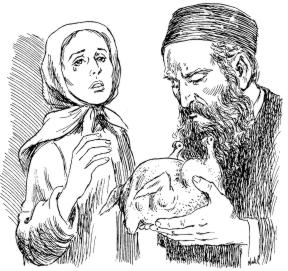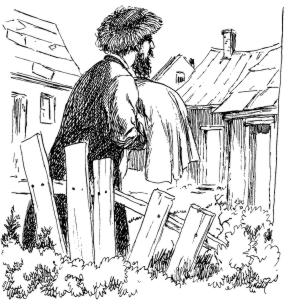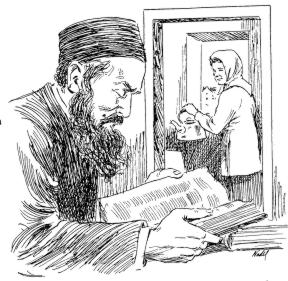SHALOCH MANOS FROM HEAVEN
Adapted from the L’Chaim Weekly Magazine
In the town of Berdichev, the shul of the famous Rabbi Levi Yitzchak began to fill up even before the sun had set. Eagerly people crowded in to hear the reading of the Megillah that would take place that night.
A feeling of excitement filled the air. Children experimented with their graggers, to see how much noise they made. Some men spoke together quietly. Others took out books of Tehillim and began reciting Psalms.
But where was Reb Levi Yitzchak? The day before Purim is The Fast of Esther, and so the evening service ought to have begun a little earlier than usual. Everyone was waiting for their beloved Rebbe to lead the davenning, but he was not there.
 |
Tears
welled up in the poor woman’s eyes. “Oh no,” she sobbed.
“What will I do now?” |
Tears
welled up in the poor woman’s eyes. “Oh no,” she sobbed.
“What will I do now?”
In fact, Reb Levi Yitzchak had been ready to join every-one else in shul,
when his secretary told him that a woman wanted to see him. In a glance, Reb
Levi Yitzchak realized that she was very poor. She stood there apologetically,
holding a chicken in her hand, asking the Rebbe if it was kosher.
Reb Levi Yitzchak examined the chicken carefully, then he sighed. No, the chicken was not fit to be eaten. It was not kosher.
Tears welled up in the poor woman’s eyes. “Oh no,” she sobbed. “What will I do now? My husband is sick, and there is no food in the house for the children. We spent our last pennies to buy this chicken. I hoped the soup would help my husband, and fill the stomachs of the children. They are so hungry. Now what will I do?” the woman cried.
“Do not worry,” said Reb Levi Yitzchak. “G-d is very great. He manages to feed the whole world every day. He will feed you and your family too.”
Then he smiled kindly. “Now go to shul, and listen to the Megillah, and don’t worry about a thing. Purim is a time of miracles, and G-d has many ways of taking care of you.”
After the woman had left, the Rebbe put on his overcoat, and went quickly home. Delicious smells of the Purim meal filled the house. Reb Levi Yitzchak went straight to the kitchen, and began gathering up all the food he could find, fish, chicken, potatoes, soup, vegetables, hamantashen, and other baked goods. Then he took a large white table-cloth, bundled the whole lot together, and then carried it out in his arms.
He
made his way through the streets of Berdichev till he came to where the poor woman lived. |
 |
He
made his way through the streets of Berdichev till he came to where the poor
woman lived.
He made his way through the streets of Berdichev till he came to the outskirts
of town where the poor woman lived. The door to her house was not locked,
and Reb Levi Yitzchak went in.
“Is that you, Sara-le?” her husband called weakly from the room where he lay in bed. “What happened with the chicken?”
“Don’t worry. A happy Purim,” Reb Levi Yitzchak called back.
“Who is that?” the surprised husband called.
“G-d has sent you Shaloch Manos for Purim,” the Rebbe replied. Then he quickly set the table neatly and hurried back to shul.
As soon as Reb Levi Yitzchak took his usual place in shul, the evening service began, followed by the reading of the Megillah. Nobody had left early, even though they had waited so long, and their stomachs gnawed with hunger. Every-one wanted to hear Reb Levi Yitzchak read the Megillah.
They were not disap-pointed. That year the Megillah reading seemed full of new meaning, especially when Reb Levi Yitzchak read the parts about celebrating Purim by sending presents of food to friends, and giving charity to the poor.
Everyone seemed to get the point. In their hearts they
realized that they had to try to have more feeling for others, more love of their fellow, the Mitzvah called Ahavas Yisroel, and to care for for the needs of other’s. Somehow, listening to Reb
Levi Yitzchak, everyone found themselves deciding to make extra efforts to fulfill these Mitzvos better.
After shul, when Reb Levi Yitzchak’s wife went home, she was startled to see that all the food she had prepared was gone! Had they been robbed?!
Aghast, she turned to her husband. But Reb Levi Yitzchak’s face was glowing with pleasure. The Rebbetzin knew her husband well, and understood immediately what must have happened.
 |
Since
there was nothing to eat, Reb Levi Yitzchok sat
down to learn, and his wife put up a kettle of
water for tea. |
Since
there was nothing to eat, Reb Levi Yitzchok sat down to learn, and his wife
put up a kettle of water for tea.
Since there was nothing left in the house to eat, Reb Levi Yitzchak went to
his study to learn. His wife put up a kettle of water for tea for them to
break their fast. Then she pulled out leftovers from here and there, and scraped
together some food for a Purim meal.
Meanwhile the poor woman returned to her home. To her amazement, she found her husband and the children all excited. The table was decked with food, and delicious aromas filled their little cottage.
“Wha- where?” the woman gasped, lost for words.
“I heard someone come in. He said it was Shaloch Manos from Heaven,” her husband explained. “By the time I got up to see who it was, he was gone. It must have been... Eliyahu himself! Can you believe that?” he laughed. “It’s a miracle. You see, G-d has not forgotten us after all!”
The woman, her husband, and the little children all began to laugh and dance with joy that they had not known in years. With deep gratitude in their hearts, they ate their Purim meal.
The next morning, unable to contain their excitement, the children told their friends about the great miracle, that Eliyahu had visited their home. The children of the town told their parents. And their parents understood why their Rebbe had been so late in coming to shul the night before. He had been Eliyahu HaNovi.
Taking their hint from the Rebbe, people outdid them-selves sending generous presents of food to the poor family, and in sending food and charity to all the poor of the city.
Of course, they did not forget their own Rebbe, who had given away his own last morsels of food. Everyone knew that he did not like to accept presents, but on Purim it was a Mitzvah. Reb Levi Yitzchak received so much that he had enough for his own Purim meal, and plenty left over to distribute to the poor of the city.
[HOME] [BACK TO RABBI LEVI YITZHAK]